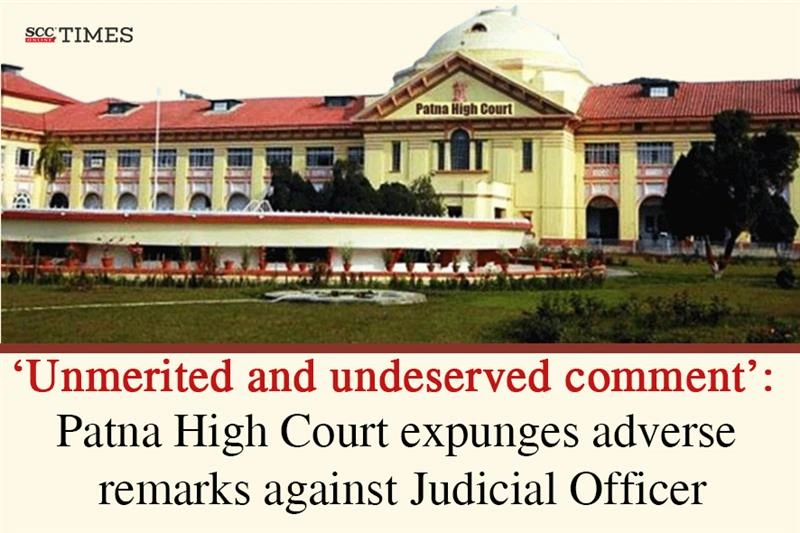Patna High Court: In a Letters Patent Appeal filed against the adverse remarks by a Single Judge in a Criminal Revision against a Judicial Officer, the Division Bench of Ashutosh Kumar, ACJ* and Partha Sarthy, J., expunged the adverse remarks and associated administrative directives. The Court held that the remarks were unmerited and the directions to strip him of Sessions’ powers and place him solely on the civil side were made without affording him an opportunity to be heard. The Court further clarified that administrative powers over judicial functions rest exclusively with the Chief Justice.
Background and trajectory:
In the instant matter, certain accused persons were granted bail in a case registered for the offence punishable under Sections 420/406/409/341/323/504/506/34 of the Penal Code, 1860 (‘IPC’), Section 138 of the N.I. Act, 1881 and Section 3(1)(e)(R)(s) of the SC/ST (Prevention of Atrocities) Act, 1989, subject to specific conditions, including the deposit of an amount of Rs. 90,000 via a cheque. Subsequently, this cheque was dishonoured, leading to the cancellation of their bail. Aggrieved by the cancellation of their bail, the accused persons had filed a criminal revision before the Single Judge. The Single Judge dismissed this revision petition, holding that any order passed by the Special Judge under the SC/ST Act was appealable under Section 14A of the SC/ST (Prevention of Atrocities) Act, 1989, and thus the revision was not maintainable.
The Single Judge then proceeded to make severe comments against the Judicial Officer without verifying the facts of the case. The Single Judge observed that the Judicial Officer lacked knowledge of the basic tenets of criminal law and, therefore, possessed no right to discharge duties as an Additional Sessions Judge. Furthermore, the Single Judge directed that the Sessions power of the concerned Officer be taken away forthwith, directing the Registrar General to pass necessary orders immediately to place the said Judge solely on the civil side for the disposal of civil cases and appeals. Further, the Officer be kept under administrative watch by the Court regarding his judicial work for the next six months. The directions issued by the Single Judge assumed the trappings of an order passed under Article 226 of the Constitution of India, which is an appealable order. Hence, the present appeal was filed.
Observations of the Court:
The Court observed that the order passed by the Single Judge was harsh, absolutely unmerited, and an undeserved comment on a Judicial Officer.
The Court referred to Raghubir Saran (Dr.) v. State of Bihar, 1963 SCC OnLine SC 102, which discussed the inherent power of an Appellate Court to expunge remarks. It was held that judges exercising powers must be free to express their minds, and judicial function cannot be effectively discharged if a Judge must conform to expressions approved by higher courts. However, in the event of a complaint against the unmerited and undeserved comments, the Appellate Court must address it, considering expunction if the observations are not justified or are wholly wrong or improper, factually or otherwise. The Court emphasized that impertinent, en-passant remarks, which in a way castigate or stigmatize, must be eschewed as part of the self-imposed duty of a Judge.
The Court noted that the observations made by the Single Judge against the Judicial Officer were absolutely unmerited, undeserved, and not worth being retained in the order. The Court noted that the Judicial Officer was castigated without being the author of the bail cancellation order. Furthermore, the Court observed that the power to strip a Judicial Officer of criminal judicial powers and place them on the civil side is an administrative power to be exercised by the Chief Justice, not by a Single Judge acting in revisional jurisdiction.
The Court further noted that the Supreme Court in Om Prakash Chautala v. Kanwar Bhan, (2014) 5 SCC 417, had held that such findings are worth avoiding in the judgments, and while penning down the same, there should be a control over the language. A Judge is not to be guided by any kind of notion. The decision-making process expects a Judge or an adjudicator to apply restraint, ostracise perceptual subjectivity, and make one’s emotions subservient to one’s reasoning and think dispassionately.
In light of the afore-stated reasons, the Court allowed the appeal to the extent of expunging the adverse remarks and the direction to the Registrar General for stripping the Judge of his judicial powers. The Court observed that such expunged observations against the Judicial Officer shall not ever percolate in his ACR or be used for any purpose in any proceeding whatsoever.
The Court further clarified that it had not questioned the correctness of the decision of the Single Judge dismissing the revision petition on technical grounds, but only expressed dissatisfaction over the en-passant, unnecessary, and adverse remarks against a Judicial Officer without affording him any opportunity.
[The High Court of Judicature at Patna through the Registrar General, Patna High Court v. Rafiqul Islam, 2025 SCC OnLine Pat 2428, decided on 14-07-2025]
*Judgment by Justice Ashutosh Kumar, ACJ
Advocates who appeared in this case:
For the Appellant: Piyush Lall, Advocate
For the Respondent: Vikas Kumar, AC to AG





